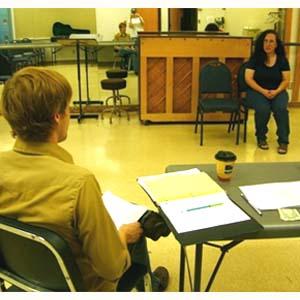Fantastic, you’ve got an audition. But now, that you’ve stopped jumping up and down, the nerves have set in. It’s like that exciting first date, you’re full of hopes and fears, and you’ve no idea what to expect. Well, actually chances are you do – think about it for a moment.
Expect:
– a really empty room with a small group of people staring at you.
Sometimes it will be a tiny room, sometimes an enormous empty stage, either way the hardest part of an audition is putting yourself on the line and walking in. Don’t let the idea of it freeze you up, they’re just people. They may be the producer, the executive producer, the casting agent and their assistant, and sometimes a camera operator too. Whoever they turn out to be they’re your first audience in this role, a small but crucial one. Remember, audiences want you to be great, they want you to entertain them. The casting crew wants you to be great too, show them that you are.
– to perform.
Any audition is a performance. From the moment you walk in you’re ‘in the spotlight’ and you want it to stick to you like glue. Be confident, walk tall and with grace. Make eye contact. Say hello. Be polite. After all, you’re meeting people for the first time; you should make a good impression and ooze charisma, even if you feel like jelly inside. When it’s time to say your lines, try not to rush, speak clearly and breathe! Keep up your energy and give it your all.
– the unexpected
Depending on the role and the circumstances you may go to an audition with well-prepared monologues or a script you’ve been given some weeks in advance to study. Other times it will be a ‘cold read’ where you will be given a script only when you arrive and have only a few minutes to get the feel for the character and the scene. You may be given a mark to stand on so your performance can be filmed or you may have free range of movement across the space. Other times you may read with someone else, who may or may not be an actor or be asked to improvise or perform your piece again in a variety of different ways. The more auditions you do the more familiar you will become with the weird and wonderful situations that can be thrown at you. It’s scary but it’s also part of the fun, be creative, let yourself go but always listen and follow all the instructions you are given carefully.
– to mess up (just a little bit).
It’s okay if you stuff up, to stop and start again. Knowing you’re getting it wrong, and having the ability to start again shows both confidence and self-knowledge. How you recover is important and says a lot about your approach. But that doesn’t mean you can get away with not knowing your lines. A few nerves can be forgiven but they need to know you can do the job.
– to be actor.
Are you a professional actor who deserves to be paid for what they do? Hopefuly the answer’s, yes. Auditions are just part of the job, and you will be doing a lot of them in your career. Don’t apologise, there should be no need to if you’re prepared. And try not to be over eager or desperate. Sure, everyone’s had the babbling nerves from time to time but the more you can zone in on your place of inner calm the better. This is what you do.
– to not get all the answers on the day.
Say thankyou, wait to see if they have any questions and leave with as much style and grace as you arrived. They’re on a schedule, and it’s not cool to linger or interrogate them.
– that if you don’t get it this time, you will try again.
It goes without saying that rejection is tough. But self-flagellation about what went wrong is not useful. With the rare exception, actors don’t work alone. Casting is about fitting you not only into a role but into an ensemble and getting the right mix can be the hardest part of casting. And consider, you’re already in a better place from where you started – they’ve met you. The casting agent now has an impression in their mind of your abilities and will have considered what other kinds of roles you might be able to do. The next time a likely role comes up they’ll be thinking of you. The more you audition, the more people get to know you and the better you get at auditioning. It’s all good.





